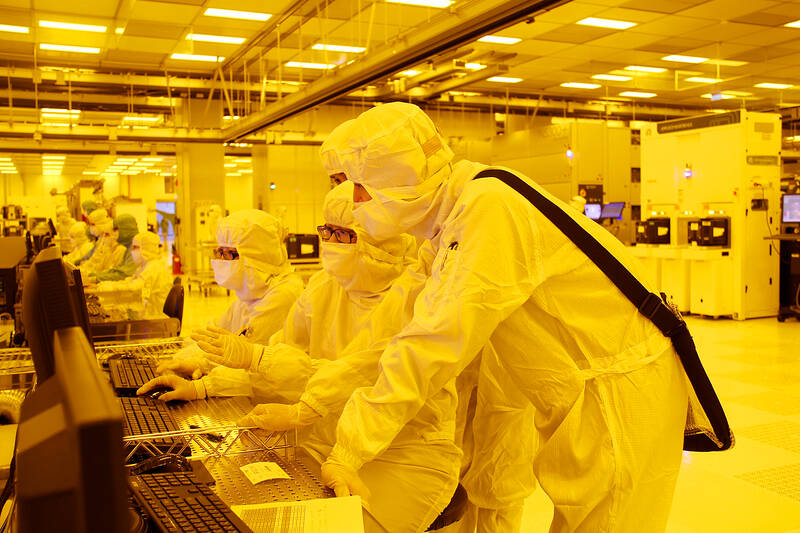The Ministry of Economic Affairs yesterday set the research-and-development (R&D) investment threshold at NT$6 billion (US$195.2 million) for companies to qualify for tax incentives under recently approved amendments to the Act for Industrial Innovation (產業創新條例), or Taiwan’s version of the US’ CHIPS and Science Act.
That requirement is less strict than the government’s original plan of setting a threshold of between NT$5 billion and NT$10 billion. However, it is much higher than the annual average of NT$3 billion spent on R&D by the nation’s top 100 companies, Industrial Development Bureau data showed.
Companies are also required to set aside at least 6 percent of their revenue for R&D to qualify for the incentives, the ministry said.

Photo courtesy of Siliconware Precision Industries Co
Top businesses that are strategically important to global supply chains are the target of the new tax break program, rather than small and medium-sized companies, which are eligible for similar tax breaks on smart manufacturing under other rules, the bureau said.
Besides, the program is aimed at encouraging more overseas Taiwanese businesses to invest back home, it said.
Semiconductor firms are not the only companies eligible for the tax breaks, the ministry said. The program is also applicable to companies that are capable of developing world-leading or innovative and scalable technology in strategic industries such as 5G, electric vehicles and low Earth orbit satellites.
The Legislative Yuan passed the amendments to the Act for Industrial Innovation in January, boosting tax breaks for local companies’ R&D investment from 15 percent to 25 percent, and offering an additional 5 percent tax credit for NT$10 billion spent on new equipment for advanced process technology, in parallel with the US’ Creating Helpful Incentives to Produce Semiconductors (CHIPS) and Science Act to boost advanced chip capacity.
As for the minimum corporate income tax rate, it would remain at 12 percent this year for qualified businesses and rise to 15 percent in 2025, the ministry said.
The ministry said it prefers to maintain some flexibility regarding the minimum rate for next year, which would likely hinge on the tax rates imposed by Organisation for Economic Co-operation and Development members.
The new tax incentives will be in place for seven years, starting this year, and the ministry will start accepting applications next year based on their investments this year.
Taiwan Semiconductor Manufacturing Co (TSMC, 台積電) is widely considered to be on top of the short list for tax breaks, as the world’s biggest contract chipmaker plans has set capital expenditure this year at US$32 billion to US$36 billion.
TSMC allocates about 8 percent of its annual revenue to R&D expenditure, with 80 percent of the amount going into next-generation technology, the company’s annual report says.
TSMC has said that its 2-nanometer process technology would be the world’s most advanced technology when it becomes commercially available in 2025.

CALL FOR SUPPORT: President William Lai called on lawmakers across party lines to ensure the livelihood of Taiwanese and that national security is protected President William Lai (賴清德) yesterday called for bipartisan support for Taiwan’s investment in self-defense capabilities at the christening and launch of two coast guard vessels at CSBC Corp, Taiwan’s (台灣國際造船) shipyard in Kaohsiung. The Taipei (台北) is the fourth and final ship of the Chiayi-class offshore patrol vessels, and the Siraya (西拉雅) is the Coast Guard Administration’s (CGA) first-ever ocean patrol vessel, the government said. The Taipei is the fourth and final ship of the Chiayi-class offshore patrol vessels with a displacement of about 4,000 tonnes, Lai said. This ship class was ordered as a result of former president Tsai Ing-wen’s (蔡英文) 2018

UKRAINE, NVIDIA: The US leader said the subject of Russia’s war had come up ‘very strongly,’ while Jenson Huang was hoping that the conversation was good Chinese President Xi Jinping (習近平) and US President Donald Trump had differing takes following their meeting in Busan, South Korea, yesterday. Xi said that the two sides should complete follow-up work as soon as possible to deliver tangible results that would provide “peace of mind” to China, the US and the rest of the world, while Trump hailed the “great success” of the talks. The two discussed trade, including a deal to reduce tariffs slapped on China for its role in the fentanyl trade, as well as cooperation in ending the war in Ukraine, among other issues, but they did not mention

Japanese Prime Minister Sanae Takaichi yesterday lavished US President Donald Trump with praise and vows of a “golden age” of ties on his visit to Tokyo, before inking a deal with Washington aimed at securing critical minerals. Takaichi — Japan’s first female prime minister — pulled out all the stops for Trump in her opening test on the international stage and even announced that she would nominate him for a Nobel Peace Prize, the White House said. Trump has become increasingly focused on the Nobel since his return to power in January and claims to have ended several conflicts around the world,

GLOBAL PROJECT: Underseas cables ‘are the nervous system of democratic connectivity,’ which is under stress, Member of the European Parliament Rihards Kols said The government yesterday launched an initiative to promote global cooperation on improved security of undersea cables, following reported disruptions of such cables near Taiwan and around the world. The Management Initiative on International Undersea Cables aims to “bring together stakeholders, align standards, promote best practices and turn shared concerns into beneficial cooperation,” Minister of Foreign Affairs Lin Chia-lung (林佳龍) said at a seminar in Taipei. The project would be known as “RISK,” an acronym for risk mitigation, information sharing, systemic reform and knowledge building, he said at the seminar, titled “Taiwan-Europe Subsea Cable Security Cooperation Forum.” Taiwan sits at a vital junction on